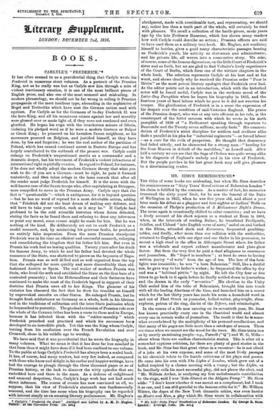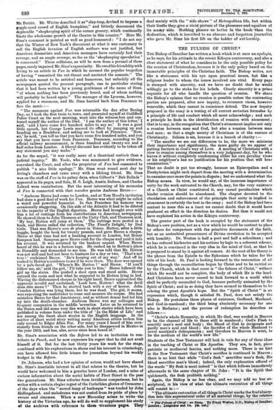MR. SIMS'S REMINISCENCES.• Tan titles of some books are misleading,
but when Mr. Sims describes his reminiscences as " Sixty Years Recoreetions of Bohemian London" his claim is fulfilled by the contents. As a matter of fact, his memories transcend the sixty years' limit, for he saw the funeral of the Duke of Wellington in 1852, when he was five years old, and about a year
later made his debut as a playgoer and first-nighter at Sadlers' Wells on the occasion of Phelps's production of A _Midsummer Night's .Dream. The scene again is occasionally shifted to other countries ; and we have a lively account of his short sojourn as a student at Bonn in 1804, when, in the intervals of reading Balzac, he translated Frciligrath, Schiller, and Upland " into English verse of sorts," sailed on and bathed in the Rhine, attended duels and Kermesses, frequented gambling- tables, and finally, after more than one collision with the authorities, returned to England, with one cigar and one dialer in his possession, to mount a high stool in the office in Alderagate Street where his father was a wholesale and export cabinet manufacturer and plate-glass factor. But from the-very first he paid a dual allegiance to (mint:note° and journalism. He " lisped in numbers " ; at least he owns to having written poetry "of sorts" from the age of ten. The lure of the foot- lights was irresistible ; he was " a born Bohemian." Still, like a dutiful son, he gave way to his father's wishes ; he frequented the office by day and was a " habitual pittito " by night. He left the City four or five times to go back to it again before he finally settled down to journalism and the drama in the early "seventies." _His election to the Unity Club sealed him of the tribe of Bohemian; brought him into touch with all the leading Alsatians of the time, and launched him on a career which for the last thirty years has made his name a household word in and out of Fleet Street as journalist, ballad-writer, playwright, slum. explorer, patron of the ring, diarist of the Referee, and criminologist.
In the course of a life now entering on its seventieth year, Mr. Sims has known practically every one in the theatrical world and almost every one in certain walks of journalism. The result is that he is some. what overwhelmed by the multiplicity of his personal recollections, and that many of his pages are little more than a catalogue of names. There are times when we cannot see the wood for the trees. Mr. Sims tants izcs us by merely mentioning people--e.g., Purnell (" Q") and W. G. Wale— about whom there are endless characteristic stories. This is after all a somewhat captious criticism, for there are plenty of good stories in the book, and Mr. Sims has that great virtue in a raconteur—he is nut afraid of a joke at his own expense, and some of the most lively passages in his chronicle relate to the hostile criticisms of his plays and poems. He came into his own with The Lights o' London, which grew out of a ballad inspired by a chance meeting with a tramp ; but the Lights, as he familiarly calls his meet successful play, did not please the elect, and " Mr. William Archer, in analysing my lust melodramatic contribution to the stage, said I was 'Zola diluted at the Aldgate Pump. " Mr. Sims adds: " I don't know whether it was meant as a compliment, but I took it as one, and I am still grateful to the famous critic for it." Mr. William Winter, the doyen of the New York &emetio critics, was even harder on Master and Man, a play which Mr. Sims wrote in collaboration with a My Sixty Years' Recatiodione of Bohemian London. Dy Gawp B. film.
Landon L yric 1st: :.Nash. toe. act.]
Mr. Pettitt. Mr. Winter described it as" clap-trap, devised to impress a goggle-eyed crowd of English bumpkins," and bitterly denounced the deplorable "shopkeeping spirit of the corner grocery, which continually blasts the wholesome growth of the theatre in this country." Here Mr. Sims's comment is pointed as well as good-humoured : " I do not say that the Winter of New York's discontent at what it was customary to call the English invasion of English authors was not justified, but American dramatists and American managers have certainly had their revenge, and an ample revenge, so far as the shopkeeping speculation' is concerned." These collisions, as will be seen from a perusal of these pages, rarely impaired Mr. Sims's equanimity. He owed his friendship with Irving to an article in Fun in which he accused the popular tragedian of having " canonized the cut-throat and anointed the assassin." The article was meant to be satirical and humorous, but unluckily all the newspapers quoted the peccant paragraph, one in particular stating that it had been written by a young gentleman of the name of Sims, " of whom nothing has been previously heard, and of whom nothing will probably be heard again." The manager of the Lyceum, however, applied for a summons, and Mr. Sims hurried back from Penzance to face the music :- " The summons against Fun was returnable the day after Boxing Day, so I took the first train to town, and presented myself at Guildhall Pollee Court on the next morning, went into the witness-box and con- fessed myself the author of the libel. I am the author of this letter,' I said, and I have come five hundred miles to say so.' It was a good little speech, but George Lewis marred its effect by jumping up and handing me a Bradshaw, and asking me to look at Penzance. ' Now, sir,' he said, you tell us that you have come five hundred miles, and you say that you have come from Penzance. Penzanoe, according to the official railway measurement, is three hundred and twenty-six and a half miles from London. A liberal discount has evidently to be taken off any statement you may make.' " As for the sequel, "it was really more of a theatrical matinee than a judicial inquiry." Mr. Toole, who was summoned to give evidence, convulsed the Court, and after the proprietor of Fun had consented to publish " a nice little apology," Mr. Sims went round next day to Irving's chambers and came away with a lifelong friend. Mr. Sims was on the staff of Fun in its palmy days, when Gilbert's " Bab Ballads " appeared in its pages, and Sala, H. S. Leigh, Austin Dobson, and Charles Leland were contributors. But the most interesting of his memories of Fun is connected with that macabre genius Ambrose Bierce :- "Ambrose Bierce had come to London, and at Tom Hood's invitation had done a good deal of work for Fun. Bierce was what might be called a weird and powerful humorist. In San Francisco his humour was occasionally staggering. On this side of the Atlantic it had to be diluted to the capacity of the English digestion. Bierco had brought over with him a lot of cuttings from his contributions to American newspapers. He showed them to John Thomson at the Unity Club, and Thomson said, My boy, Rotten will jump at them.' The cuttings were pasted in a book, and Bierco called the collection, ` The Fiend's Delight,' by Dod Grile. That was Bierce's nom de plume in 'Frisco. Rotten, after a little haggle, bought the book for twenty pounds, and gave Bierco a cheque. Bierce at that time had not a banking account in London, but Henry Sampson had. Sampson gave Bierce cash for the cheque and paid it into his account. It was returned by the bankers unpaid. When Bierce heard of this he was in a furious rage. He rushed up to Hotten's place in Piccadilly and demanded to see him. He was told that Mr. Rotten was not well and had not been to business for a day or two. That's not true !' exclaimed Bierce. He's keeping out of my way.' And off he rushed to Hotten's residence to see if he were there. The door was opened by a pale-faced girl. Where's Mr. Hotten P ' said Bierce. If you'll follow me, sir,' said the girl, I'll take you to him.' Bierce followed the girl up the stairs. She pushed a door open and stood aside. Bierce entered the room and saw what he supposed to be Hotten lying in bed. Waving the dishonoured cheque in his right hand, Bierce approached the apparent invalid and exclaimed, Look here, Rotten ! what the devil does ,this mean ' Then he started back with a cry of horror. John Camden Hotten was lying there, but he was dead. The girl, it seems, was expecting the undertaker to come and measure the corpse. She had mistaken Bierce for that functionary, and so without demur had led him up into the death-chamber. Ambrose Bierce was my colleague and frequent companion in the middle 'seventies. Later on he returned to the States and did some very fine work in short stories which have been published in volume form under the title of In the Midst of Life' and are among the finest short stories in the 'English language. In the matter of short weird story writing many American critics reckon him only second to Edgar Allan Poe. For many years I heard of him occa- sionally from friends on the other side, but he disappeared in Mexico in the year 1913, and has, alas, never since been heard of."
Mr. Sims's association with the Referee led to an invitation to con- tribute to Punch, and he now expresses his regret that he did not avail himself of it. But for the last thirty years his work for the stage, combined with his explorations in slums and his interest in criminology, can have allowed him little leisure for journalism beyond his weekly budget in the Referee.
Dr. Johnson, who had a low opinion of actors, would not have shared Mr. Sims's insatiable interest in all that relates to the theatre, but he would have welcomed in him a genuine lover of London, and a mine of curious information about the social habits of Fleet Street in the past two generations. Mr. Sims refrains from invidious comparisons, but he writes with a certain elegiac regret of the Corinthian glories of Cremome ; of the days when the " sacred lamp of burlesque " was tended by John Hollingshead, and melodrama was not ousted from its pride of place by revues and cinemas. When a new Macaulay arises to write the history of the Victorian age, he will do well to supplement his study of the archives with reference to these vivacious pages. They
deal mainly with the " side-shows " of Metropolitan life, but within their limits they give a vivid picture of the pleasures-and squalors of its seamy side. Nothing pleases us better in the -book than the dedication, which is inscribed to an obscure and forgotten journalist who gave Mr. Sims his first lift on the ladder of authorship.













































 Previous page
Previous page